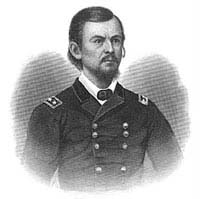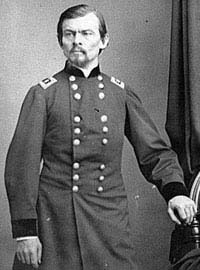Franz Sigel
Born in Baden, Germany on November 18, 1824, Franz Sigel was a graduate of the German Military Academy who came to the United States by way of Switzerland and England after resigning his commission in the German Army and fighting in that  country’s failed revolution. country’s failed revolution.
In the United States, Sigel taught in New York City schools for a time before moving to St. Louis, teaching mathematics, American history, and French at the German-American Institute in that city. He was elected director of schools in 1860.
In his position, he was influential in the emigrant community, drawing German-Americans to the Union cause when he openly supported it.
Sigel resigned his position with the public school, and organized a regiment of infantry, a battalion of artillery, and a squadron of cavalry, made up essentially of German-Americans.
Commissioned Brig. General, he commanded an expedition to southwest Missouri, and fought the Battle of Carthage with 800 of his men against 4,000 enemy troops. While it resulted in a Confederate victory, he was credited with performing well under great odds.
He served under Brig. General Nathaniel Lyon in the capture of the secessionist Camp Jackson in St. Louis, and at the Battle of Wilson’s Creek.
His finest performance in the war was at Pea Ridge on March 8, 1862. Commanding two divisions, he directed the Union artillery in the defeat of Confederate General Van Dorn, a victory for which he was promoted to Major General on March 22nd.
Transferring to the Eastern theater, he fought against Confederate General Thomas “Stonewall” Jackson in the Shenandoah Valley, and commanded the I Corps in General Pope’s Army of Virginia at the Second Battle of Bull Run. Confederate General Thomas “Stonewall” Jackson in the Shenandoah Valley, and commanded the I Corps in General Pope’s Army of Virginia at the Second Battle of Bull Run.
His useful career ended when, as Commander of the Department of West Virginia, he suffered a humiliating defeat at the Battle of New Market on May 15, 1864, a battle made famous by the charge of the Virginia Military Institute cadets.
At Harper’s Ferry, he managed to only delay General Jubal Early, and was relieved of his command soon afterward.
He resigned from the army in May of 1865, moved to Baltimore and became a journalist. Eventually he moved to New York, continuing his career in publishing while teaching English and German.
He dabbled in politics, as a Republican, and later as a Democrat, holding various civil positions but never being elected to office.
Franz Sigel died in New York on August 21, 1902.
|

